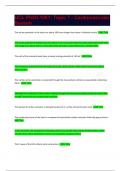Exam (elaborations)
UCL PHOL1001: Topic 7 - Cardiovascular System
- Course
- Institution
The action potentials in the heart are about 100 times longer than those of skeletal muscle. - ANS True The action potential of skeletal muscle is about 2 ms in duration while the action potentials of the heart cells range from about 150 ms in the cells of the SA node to about 300 ms in a Purkinj...
[Show more]



